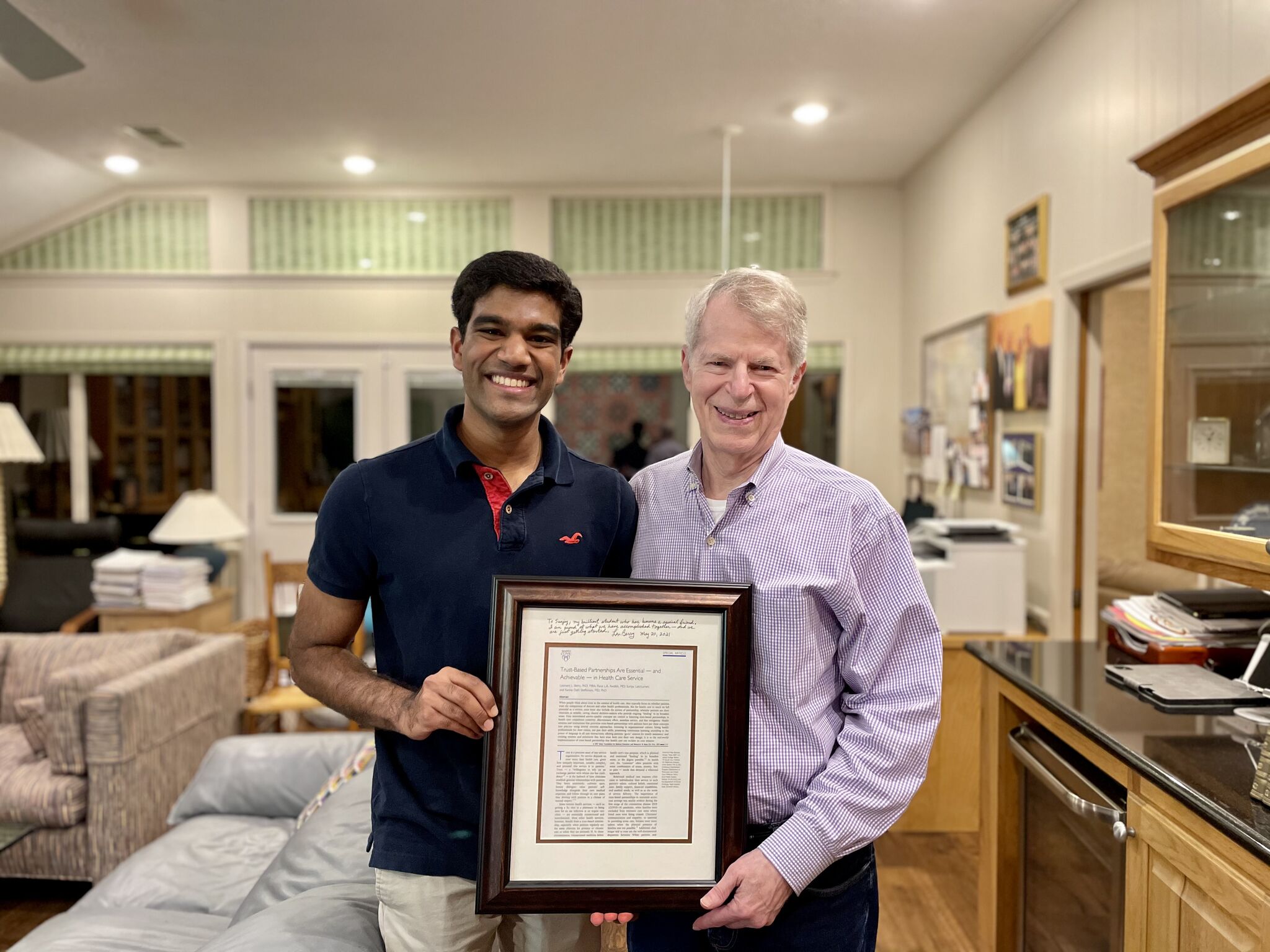Prosperity of Kindness
July 8, 2021
|
Mays Business School
Often, we define prosperity primarily by the accumulation of financial resources. However, prosperity’s definition also includes a sense of thriving—and to truly thrive as an individual, a family, an organization, a locale, a nation, or a world requires a commitment to kindness.
A simple gesture of kindness—a physician listening deeply to patients’ descriptions of their ailments and concerns may lead to improved overall health. An individual’s compassionate approach may improve a patient’s long-term quality of life. Kindness also can nourish families during a crisis—or influence the minds of the next generation gently yet positively.
Through his research in services marketing, Dr. Leonard L. Berry learns consistently about the profound power of kindness. “When kindness prevails, everyone benefits. When kindness turns into unkindness—to meanness—everyone loses sooner or later,” the University Distinguished Professor of Marketing said. “Kindness encourages, inspires, and teaches us. Being encouraged, inspired, and taught are antecedents to prosperity.”
Well-known for his own ability to encourage, inspire, and teach students, Texas A&M’s most cited researcher has deepened his own understanding of kindness through his academic partnership with Sunjay Letchuman ’22, a Mays Business Honors student. Their collaborative effort helped the aspiring physician become Mays’ first undergraduate to be published in a major medical journal.
Dimensions of Kindness
Berry’s research includes evaluations of the impacts of the role of kindness in cancer care, publishing a paper in the Journal of Oncology Practice. “The diagnosis of cancer is a life-changing experience for the patient and family,” he said. “Cancer is not necessarily the most mortal of all serious diseases, but it’s one of the most emotional diagnoses a patient can get. Kindness can go such a long way in helping diffuse and lower the anxiety and fear that patients and families face.”
Berry and his co-authors identified six dimensions of kindness: deep listening; empathy; generosity; timely care; gentle honesty; and support for family caregivers. Some of these dimensions take only a few moments, while others may require more concentrated effort. Together, they translate into greater trust as well as improved health outcomes and overall well-being for patients and for the clinicians who care for them. Kindness makes life better for everyone.

Kindness and Commitment to Community
Kindness can have important effects beyond the individual patient, including social profits and environmental consciousness for the greater good. “We can be kinder to patients, but we can also be much kinder to employees and the community,” said Letchuman. “Broadening the scope of kindness is how we become more prosperous.”
Berry and Letchuman are now expanding Berry’s prolific research in services marketing by looking at how service organizations support the greater good. The pair studied Gundersen Health System, the first health system in the nation to become energy independent. Gundersen, the largest employer in La Crosse, WI, produces more energy than it consumes through innovative renewable energy projects, recycling, and waste management, displaying kindness to the community.
Berry and Letchuman believe Gundersen illustrates the opportunity for organizational leaders to create social profits. “The culture in many hospitals says for doctors and nurses to stay in their area of expertise and that the hospital just needs to treat patients within their four walls. But it’s so much more than that; to be kind, you must be kind to the broader community around you,” Letchuman said. That is why it is so important for Gundersen’s culture of caring to extend to the communities where they are located.

Kindness encourages, inspires, and teaches us. Being encouraged, inspired, and taught are antecedents to prosperity.
– Leonard L. Berry, Ph.D.
University Distinguished Professor of Marketing

Kindness and Empowerment
The power of kindness can have far-reaching effects that empower communities during and after difficult days. In another example from Berry’s and Letchuman’s current research in services marketing, World Central Kitchen mobilizes rapidly to provide food, water and shelter to individuals affected by a disaster or emergency, such as a hurricane, earthquake, or pandemic.
The non-profit taps into its global network of chefs, but also buys from local retailers and hires local restaurant workers to prepare free meals for individuals affected negatively by a catastrophic event. The organization creates critical infrastructure—such as kitchens for new schools—and develops education programs that remain in the area after the crisis has passed. “World Central Kitchen helps prepare communities to respond better to disasters in the future,” Letchuman said. “They solve the initial problems—food, water, and shelter—that people need immediately. But after World Central Kitchen puts in electrical wiring when building a new kitchen in a disaster-struck area, they don’t take out that electrical infrastructure when they’re done. And that’s how they build resilience in vulnerable communities.”
Mentoring Future Leaders
The power of kindness also extends between generations, as illustrated by the relationship that Berry and Letchuman have developed. The Mays student first met Berry when he took the professor’s seminar, Improving Healthcare Service. “I initially admired Dr. Berry academically because he had studied the Mayo Clinic in a way few people had,” the undergraduate said. “From there, I took his class and loved every moment of it—I realized I wanted to dedicate my life to healthcare.”
Letchuman approached Berry with the idea of forging a collaboration. Berry agreed and, working with academic and healthcare co-authors, the pair completed a paper that was published in the Mayo Clinic Proceedings and are finalizing a second paper. “Over that period of time, we’ve gotten to know each other really well beyond writing and talking about healthcare,” Letchuman said. “Through that process, I’ve earned Dr. Berry’s trust, and I value that trust a lot.”
After serving as a policy intern for the U.S. Senate’s Committee on Health, Education, Labor and Pensions during the summer of 2021, Letchuman will continue to work closely with Berry during his senior year. After graduation, he has been accepted by and plans to enroll in the Icahn School of Medicine at Mount Sinai. As he moves closer to the beginning of his career, Letchuman feels grateful to have had Berry’s wisdom and kindness. “I didn’t know much about healthcare before I got to college. He has taught me to think about healthcare more broadly, and his teachings have been formative in my understanding of the healthcare industry,” said the Texas A&M University and Undergraduate Research Scholar. “The learnings that I’m gaining now are going to affect how I treat patients one day, and I feel that it is my duty to implement the health service lessons I have learned from Dr. Berry. That’s why I value the relationship we’ve built—one that is largely built on kindness – because I know what a great impact that will have.”
Check-in on Dr. Berry’s research activity via LinkedIn.


